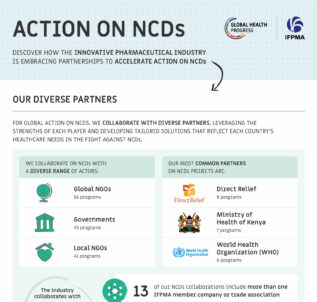Our perspectives
in one place
Topic
Selected filters
ClearNews
See allOpening statement at COP 16: Multilateral mechanism (MLM) for digital sequence information (DSI)
On 21 October 2024 in Cali, Colombia, IFPMA delivered an opening statement at the 16th meeting of the Conference of the Parties to the Convention on Biological Diversity.
Read moreWIPO Standing Committee on Patents: Statement on Technology Transfer
On 16 October 2024 in Geneva, IFPMA delivered a statement at the 36th meeting of WIPO’s Standing Committee on Patents:, on technology transfer.
Read moreWIPO Standing Committee on Patents: Statement on Patents and Health
On 16 October 2024 in Geneva, IFPMA delivered a statement at the 36th meeting of WIPO’s Standing Committee on Patents: Patents and Health.
Read moreWHO EMRO RC71: Promoting collaborative action to accelerate the response to antimicrobial resistance in the Eastern Mediterranean Region
On 16 October 2024 in Doha, Qatar, IFPMA delivered a statement at the 71st session of the WHO EMRO Regional Committee on Promoting collaborative action to accelerate the response to antimicrobial resistance in the Eastern Mediterranean Region.
Read moreWHO EMRO RC71: Regional flagship initiative 1: Expanding equitable access to medical products
On 14 October 2024 in Doha, Qatar, IFPMA delivered a statement at the 71st session of the WHO EMRO Regional Committee on the Regional flagship initiative 1: Expanding equitable access to medical products.
Read more77th WHO SEARO Regional Committee: Agenda items 8.2 and 9.6 on NCDs and UHC
On 9 October 2024 in New Delhi, India, IFPMA delivered a statement at the 77th WHO SEARO Regional Committee on Agenda items 8.2 and 9.6: NCDs and UHC.
Read morePublications
See allThe value of prevention for economic growth and the sustainability of healthcare, social care and welfare systems (The European House – Ambrosetti)
Read more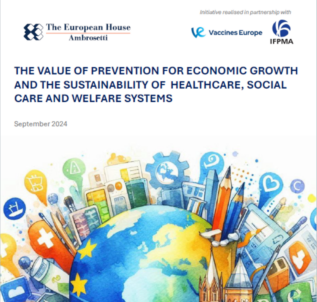
Sustainable access to effective antibiotics
In a new position paper, IFPMA explores some of the challenges in ensuring access to safe and quality-assured antibiotics and propose a set of policy changes for consideration.
Read more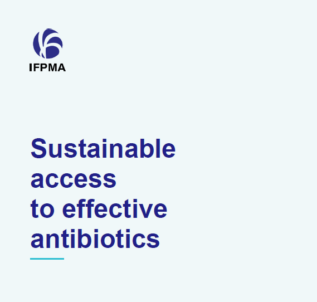
The Value of Reference Agency Assessment Reports in Enabling Regulatory Reliance
Access to information, including the assessment documents of reference national regulatory agencies (NRA), is a key enabler of regulatory risk-based decision making. It promotes an understanding of what was reviewed by the reference NRA, provides a rationale for decision making and promotes confidence and trust. The Centre for Innovation in Regulatory Science (CIRS) has published...
Read more
Expert insights
See all
Time to lead the charge: The pharmaceutical industry’s role in combating NCDs
Read more
Celebrating a decade of ethical collaboration: An international consensus of healthcare leaders looks to the future
Read more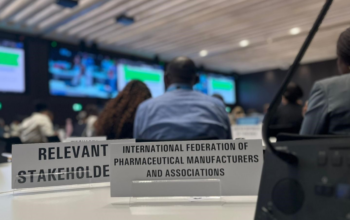
A framework for trust and global solidarity for the next pandemic
Read moreResources
See allOur Ethos in Action – Decision-Making Framework Toolkit
IFPMA has developed a Five-Phase Decision-Making Framework, grounded in the IFPMA Ethos or value system, to help companies make decisions that balance business objectives and ethical considerations to meet patient needs and the expectations of the medical community, regulators, and society.
Read more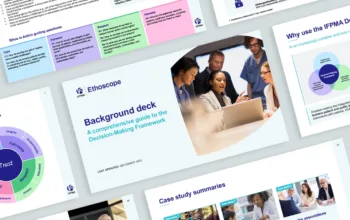
February 2024: Impact of a waiver of intellectual property rights for COVID-19 therapeutics
As discussions on an extension of a waiver of intellectual property (IP) rights on COVID-19 therapeutics continue, latest evidence and data published today explains what the adverse impact of a waiver may be on the entire innovation ecosystem and the consequences it may have on industry’s ability to fight future pandemics.
Read more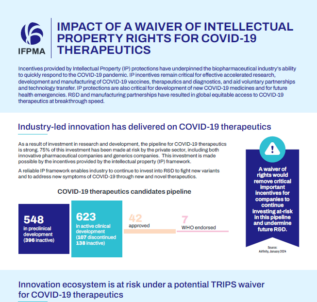
Action on NCDs: How the innovative pharmaceutical industry helps bridge the care gap
Read more